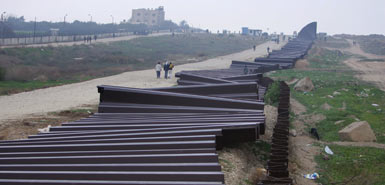False pretenses
By Charles Lewis and Mark Reading-Smith, Center for Public Integrity, January 23, 2008
President George W. Bush and seven of his administration’s top officials, including Vice President Dick Cheney, National Security Adviser Condoleezza Rice, and Defense Secretary Donald Rumsfeld, made at least 935 false statements in the two years following September 11, 2001, about the national security threat posed by Saddam Hussein’s Iraq. Nearly five years after the U.S. invasion of Iraq, an exhaustive examination of the record shows that the statements were part of an orchestrated campaign that effectively galvanized public opinion and, in the process, led the nation to war under decidedly false pretenses.
On at least 532 separate occasions (in speeches, briefings, interviews, testimony, and the like), Bush and these three key officials, along with Secretary of State Colin Powell, Deputy Defense Secretary Paul Wolfowitz, and White House press secretaries Ari Fleischer and Scott McClellan, stated unequivocally that Iraq had weapons of mass destruction (or was trying to produce or obtain them), links to Al Qaeda, or both. This concerted effort was the underpinning of the Bush administration’s case for war. [complete article]
See also, British government ordered to disclose draft Iraq dossier (The Guardian).
Troops felled by a ‘trust gap’
By Mark Perry, Asia Times, January 24, 2008
For many among the senior leadership at the Pentagon… the apparent successful spread of the “Awakening of the Tribes Movement” has been tempered by the realization that the initiative put in place in Fallujah and Ramadi and Babil could have been – and should have been – put into practice five years ago.
Pentagon officials are quick to blame former Iraq czar L Paul Bremer of the US Coalition Provisional Authority (CPA) for the failure. “We’re reconstituting the Iraqi military, that’s all this is” a Pentagon official notes. “A lot of these guys in Babil that we’re paying lost their salaries when Bremer disbanded the Republican Guard and broke up the Ba’ath Party. It was a stupid move. So this is a make-good.”
Another Pentagon official remembers the opening to Gaood in 2004: “This should have been done then,” he says, “and I don’t understand why it wasn’t. Think of the blood, the enormous loss of life, the lost prestige, the failures.” Pentagon officers are also quick to point out that, while Petraeus has taken credit for the shift in strategy in Iraq, the “Awakening of the Tribes Movement” actually began long before he recommended an increase in American troops levels in the country. [complete article]
Iraq’s new law on ex-Baathists could bring another purge
By Amit R. Paley and Joshua Partlow, Washington Post, January 23, 2008
Maj. Gen. Hussein al-Awadi, a former official in Saddam Hussein’s Baath Party, became the commander of the Iraqi National Police despite a 2003 law barring the party from government.
But now, under new legislation promoted as way to return former Baathists to public life, the 56-year-old and thousands like him could be forced out of jobs they have been allowed to hold, according to Iraqi lawmakers and the government agency that oversees ex-Baathists.
“This new law is very confusing,” Awadi said. “I don’t really know what it means for me.”
He is not alone. More than a dozen Iraqi lawmakers, U.S. officials and former Baathists here and in exile expressed concern in interviews that the law could set off a new purge of ex-Baathists, the opposite of U.S. hopes for the legislation.
Approved by parliament this month under pressure from U.S. officials, the law was heralded by President Bush and Iraqi leaders as a way to soothe the deep anger of many ex-Baathists — primarily Sunnis but also many Shiites such as Awadi — toward the Shiite-led government.
Yet U.S. officials and even legislators who voted for the measure, which still requires approval by Iraq’s presidency council, acknowledge that its impact is hard to assess from its text and will depend on how it is implemented. Some say the law’s primary aim is not to return ex-Baathists to work, but to recognize and compensate those harmed by the party. Of the law’s eight stated justifications, none mentions reinstating ex-Baathists to their jobs. [complete article]

 through the breach surged some 350,000 Palestinians — fully one fifth of Gaza’s total population, as my friend and colleague
through the breach surged some 350,000 Palestinians — fully one fifth of Gaza’s total population, as my friend and colleague